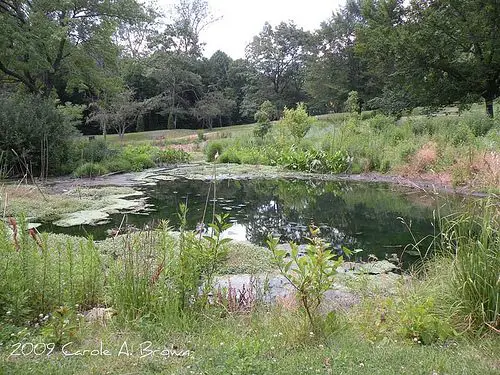The World Resources Institute published an article describing how corporations can contribute to the health of essential ecosystem services. Our goal here is to show how every one of us can make the same contribution in our gardens.
A healthy, intact ecosystem provides many critical services on which we as humans are dependent for our continued well-being and existence. Most of these services go on unnoticed by us but are critical for our health and economy. Habitat destruction and species decline are interfering with the ability of ecosystems to successfully perform these functions.
These services include:
- purification of air and water
- production of oxygen
- mitigation of droughts and floods
- generation and preservation of soils and renewal of their fertility
- detoxification and decomposition of wastes
- carbon sequestration
- pollination of crops and natural vegetation
- dispersal of seeds
- cycling and movement of nutrients
- control of the vast majority of potential agricultural pests
- maintenance of biodiversity
- protection of coastal shores from erosion by waves
- protection from the sun’s harmful ultraviolet rays
- partial stabilization of climate
- moderation of weather extremes and their impacts
- provision of aesthetic beauty and intellectual stimulation that lift the human spirit
We don’t pay for ecosystem services so we don’t think about their cost
Many of these services, including production of oxygen and carbon sequestration, are never considered when planning for development because we don’t pay for them; there is no economic market for these services. Because no one is making a profit from these services we tend to ignore their importance. Imagine if, when we got our gas, electric, and water bills each month, we also received a bill for the oxygen we had breathed, or the enjoyment we had taken by walking in a local park, or protection from UV rays.
However, we do pay for them. There are enormous costs associated with restoring these services after we have destroyed them. For example, we have spent billions of dollars cleaning up polluted rivers, lakes, and streams. We pay a high price for healthcare-related costs associated with asthma and other respiratory illnesses when we breathe air that has been polluted or is full of particulate matter.
Quality of ecosystem services is decreasing
The Millennium Ecosystem Assessment has divided these services into several categories: Provisioning Services, Regulating Services, and Cultural Services. According to this report, over half of the provisioning services and nearly 70% of regulating and cultural services are being degraded or used unsustainably. Our air and water are being polluted, clean drinking water is unavailable in many places, our soil is eroding, and biodiversity is declining.
The role of your garden in providing ecosystem services
We have seen that habitat loss, fragmentation, and degradation due to human activity are the primary reasons for the decline of so many species. If our activities can be harmful, they can also be helpful if we so choose. I have been saying for years that if every one of us did just one thing to benefit wildlife on our properties, the results could be amazing. We can learn to share our lives and property with wildlife by giving back a little bit of habitat. The effects of human alteration of the land have touched every place on earth, no matter how far from human settlement they may be. Therefore, it is in our hands to make some choices that will, in part, reverse this trend. Our role as property owners is first to take a landholder version of the Hippocratic Oath: DO NO HARM. We will be discussing in detail the harmful gardening practices that we can reduce or eliminate from our properties in later chapters.
For now, we can learn to share our environments with the wildlife around us. We can give back some habitat within the confines of our own properties. With so much of our land given over to human development, consumption, and recreation, property owners must devise ways of working with this fact to attain the goal of preserving species diversity. Michael Rosenzweig, in Win-Win Ecology, calls this process reconciliation ecology, which he defines as:
the science of inventing, establishing, and maintaining new habitats to conserve species diversity in places where people live, work, or play
Here are some ways that your garden can contribute to ecosystem services that are essential to human health (and the health of other wildlife):
- Vegetation produces oxygen. So increasing the amount of vegetation, especially trees, helps create cleaner air.
- Native trees, shrubs, and perennial plants also prevent soil erosion, help rainwater slowly percolate through the soil, and provide welcoming habitats for wildlife survival.
- Trees are essential to carbon sequestration, keeping excess carbon from entering the atmosphere.
- A properly placed tree can shade your house and reduce air conditioning costs.
- Locally native plants that are adapted to the conditions in your garden do not require supplemental water, thus helping in water conservation.
- A wide variety of flowering plants, with varying bloom times throughout the seasons, are essential for native pollinators, whose numbers are steeply declining due to habitat loss.
More From Ecosystem Gardening:
Submit your review | |
Every service has their own disservices. We all love in the Hippocratic world like go green save trees But when it comes to be practical paradigm. Services are countless. Theory of economy not calculating non profits or economic gains. Work of care givers services are quantify when we hire the maid service not mother services. Same in the mother nature people are free drivers. Oxegen cylinder water bottles have value. But f air and water doesn't have any accountability in GDP. Where companies produce only bottles and cylinders we are ready to pay. Can't to pay for an ecosytem.There is no willingness to pay for even attention.








